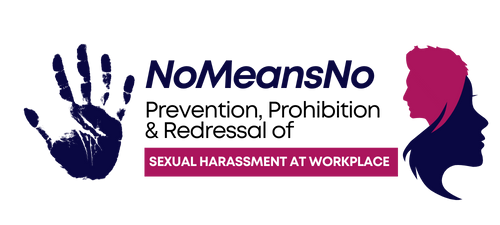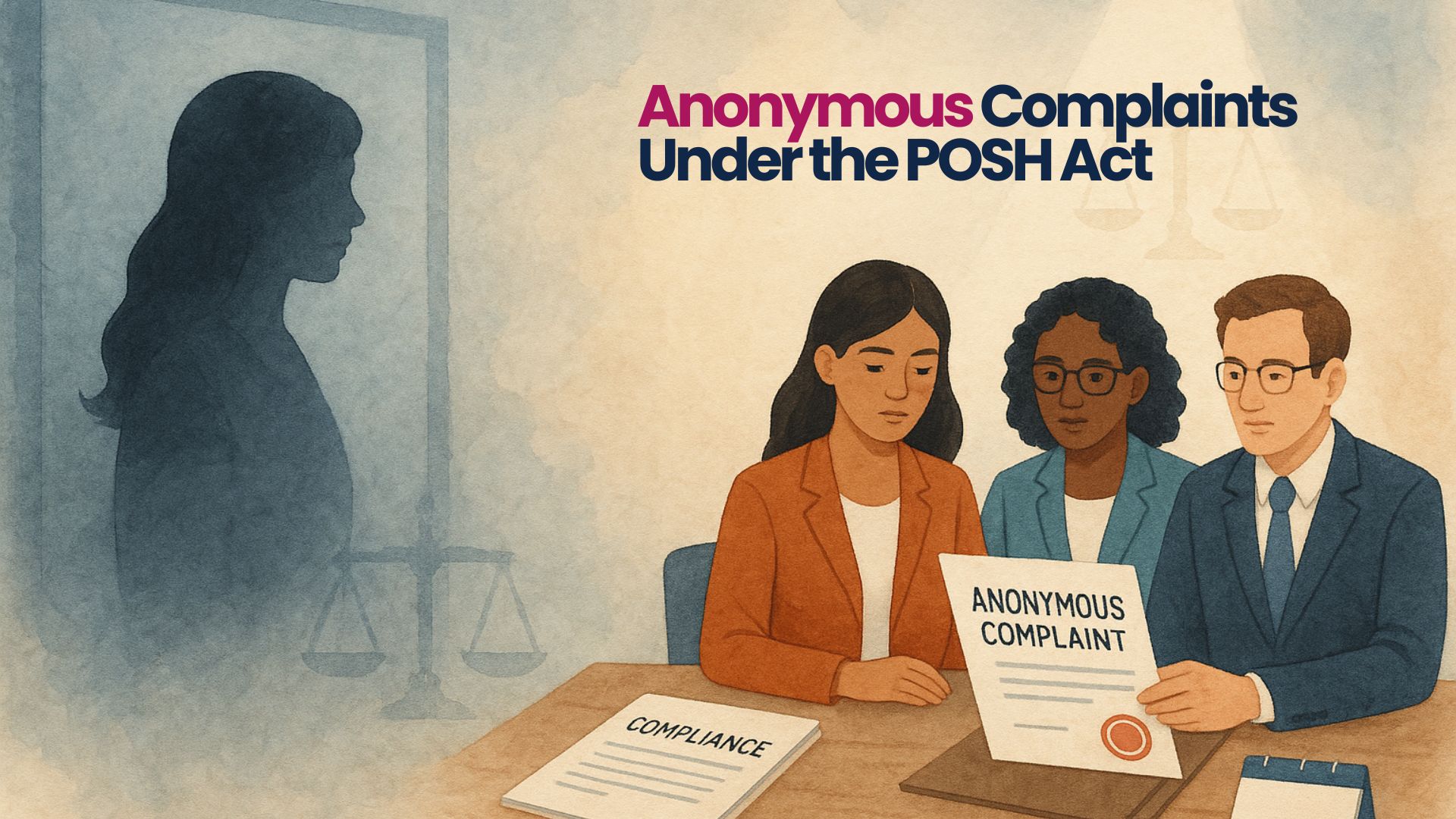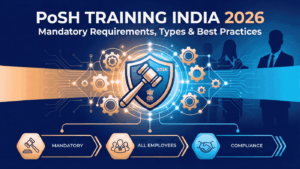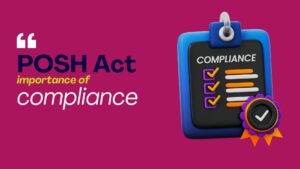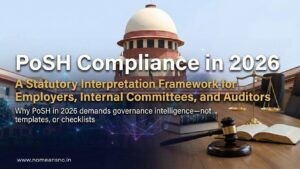How Anonymous Complaints are Handled Under the POSH Act?
The sad reality of the world we live in is that women are harassed more often than we’d imagine, and even today, women hesitate to come forward with complaints. A plethora of reasons come into play, such as social stigma, loss of job, retaliation from the accused, and more.
The Prevention of Sexual Harassment (POSH) Act, 2013, was passed to provide a secure and respectful working environment for women in India. Although the Act has a comprehensive mechanism for handling sexual harassment, the question of anonymous complaints under POSH Act is a contentious and controversial issue. Anonymous complaints can be a tricky zone for organizations navigating through the treacherous waters of POSH. Such complaints must be handled effectively and efficiently, making sure justice is delivered no matter how complicated the case.
This article explores the legal intricacies of anonymous complaints under the POSH Act, their admissibility, challenges, and best practices for employers and Internal Committees (ICs).
Let’s begin!
Understanding Anonymous Complaints
- Anonymous complaints under POSH mean complaints made without revealing the identity of the complainant. Complainants might make complaints in fear of reprisal, social stigma, or distrust in the redressal mechanism. Anonymity can facilitate reporting but creates substantial problems in investigation and providing justice to all the parties concerned.
- Legal Provisions Under the POSH Act
Section 9 of the POSH Act requires a written complaint from an aggrieved to the IC within three months of occurrence. It does not define the admissibility of anonymous complaints in POSH. It is this loophole that has caused different interpretations and practices across organizations. - Judicial Interpretations
Courts have stressed the need to follow the principles of natural justice, which mandate that the accused be notified of the charges and afforded an opportunity to reply. In Abraham Mathai v. State of Kerala, the Kerala High Court ruled that oral complaints could not replace the written form mandated under the POSH Act.
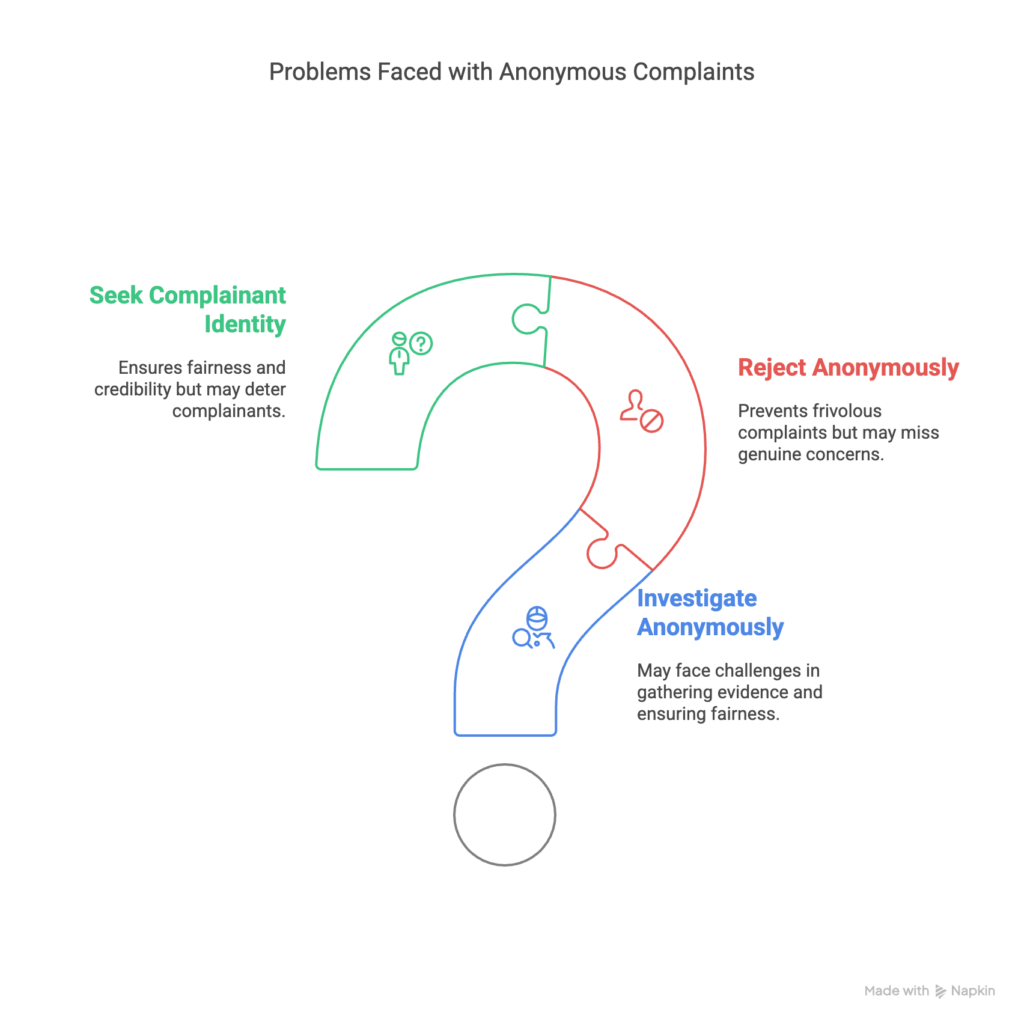
Problems Faced with Anonymous Complaints
- Problems with the Investigation: When the identity of the complainant is unknown, the Internal Committee (IC) will face substantial issues in getting evidence, locating witnesses and context on the alleged act. Anonymous complaints under POSH limit the overall effectiveness of inquiry as an evidential tool.
- Potential for Frivolous or Malicious Complaints: Anonymous complaints in POSH may be used against the objectives of the claims process to level frivolous or malicious complaints. This can create difficulty and reputational harm for innocent individuals while exerting stress and pressure, so ultimately damages the ability to give believed credibility to this mechanism for redress.
- Violating the Principles of Natural Justice: If the significance of anonymous complaints in POSH to the process is merely that they can be pursued and evidence gathered to the best of the committee’s effort, then it is potentially damaging to the respondent’s right to a fair hearing. It is essentially failing to allow the respondent to formulate a proper defence of themselves by having no idea of the nature of the complaint, and none of the complainants details.
Best Practices for Employers and ICs
- Encourage Formal Complaints: Organizations should create an environment in which employees are able to report incidents safely, including an assurance of confidentiality and no retaliation.
- Preliminary Review: In case of anonymous POSH complaints, the IC can do a preliminary review, which involves figuring out whether there is enough information to carry on with an inquiry. If the complaint is not specific, the IC could try to communicate with the complainant or decide to not pursue the complaint.
- Protection of Confidentiality: Even when the complainant discloses their identity, it is important for the IC to ensure confidentiality throughout the investigation process for all parties involved.
- Clarification of Policies: Organizations should be clear on their policies about anonymous complaints in their POSH policy; otherwise, the employees will not know about the process or whether their complaint would be carried through.
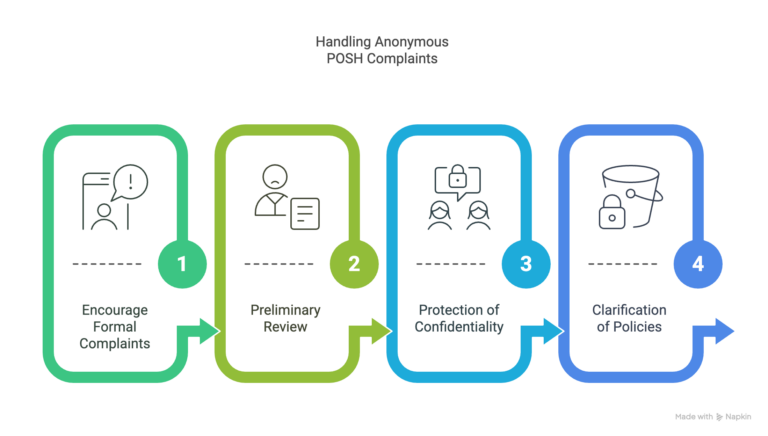
How NoMeansNo Can Help
At NoMeansNo, we offer end to end POSH compliance training and consulting to organizations in every sector. Our Co-Founder, Vishal Bhasin has significant hands-on experience serving as an External member for over 300 organizations. This depth of experience enables us to offer organizations guidance not just on compliance, but more importantly, the more nuanced realities of implementing POSH in practice.
We help organizations to:
- Draft or revise POSH policies wrt anonymous complaints
- Train employees and IC’s (Internal Committee)
- Deliver Virtual and in-person Train the Trainer (TTT) program for POSH IC’s.
- Provide practical, legal and ethical insight on tricky or sensitive complaints.
While anonymous complaints in POSH are not categorically allowed or disallowed, organizations must tread carefully in this unwritten space. Addressing such complaints is quintessential for organizations to meet the annual POSH compliance.
There will always be a balance between providing a safe reporting environment and respecting the principles of natural justice. With clear policies, a commitment to confidentiality, and trust, employers can begin to go some way to meet the challenges submitted by anonymous complaints and respect the intent of the POSH Act.
#NoMeansNo
